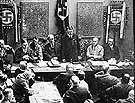
|
|
|

|

|

|

|
|
Click on an image to see a larger, more detailed picture.
|
|
|
|
|
| PROLOGUE: Roots of the Holocaust |

|
pg. 28 |

|
|
|
|
| |
 The Depression hit Germany hard, forcing proud parents to send their children to soup kitchens operated by the Salvation Army.
The Depression hit Germany hard, forcing proud parents to send their children to soup kitchens operated by the Salvation Army.
Photo: Ullstein Bilderdienst
|
 Hitler addresses the NSDAP leaders' meeting in Munich in August 1928. He argued that the Nazis' poor showing in the May elections necessitated radical changes in strategy.
Hitler addresses the NSDAP leaders' meeting in Munich in August 1928. He argued that the Nazis' poor showing in the May elections necessitated radical changes in strategy.
Photo: Archive Photos: F11EMB9
|
|
Gerlich wanted his fellow Germans to understand that Hitler's way was neither the right way nor the German way. As 1932 wore on, Gerlich and the other anti-Hitler journalists had some reason to hope. Although the Nazis had achieved their high-water mark in freely contested national elections by winning 37.3 percent of the popular vote (230 seats in the Reichstag) on July 31, 1932, their popularity declined during the next elections. On November 6, 1932, they received 33.1 percent of the popular vote and their Reichstag seats declined to 196. But overall the political tide was running with Hitler more than against him, and the anti-Hitler journalists could not stem it. Still, Fritz Gerlich did not give up. On March 9, 1933, more than five weeks after Hitler took power, Gerlich prepared to publish yet another anti-Hitler attack in Der Gerade Weg. Perhaps he wanted to make new charges about Hitler's role in the untimely death of Geli Raubal. Perhaps he intended to arouse suspicion that the Nazis themselves--not Communists, as the Nazis claimed--had torched the Reichstag building on February 27, an action that Hitler used to convince the German president, Paul von Hindenburg, to issue the "Presidential Decree for the Protection of People and State." Its emergency measures, which remained in place throughout the Nazi period, suspended freedom of speech, press, and assembly; eliminated freedom from invasion of privacy; and abolished freedom from house search without warrant. These measures also made distribution of politically unacceptable material a treasonous crime punishable by death. Apparently a last-ditch effort to derail Hitler, the contents of Gerlich's March 9 report remain unknown because on that day, as journalist Ron Rosenbaum aptly summarizes the situation, "Storm Troopers burst into Gerlich's newspaper office, ripped his last story from the presses, beat him senseless, and dragged him off to Dachau." Gerlich was imprisoned in the German concentration camp for more than a year. Then, his wife got the message that the Nazis had killed the journalist who had seen through them all. The notice contained no words, just his steel-rimmed, blood-spattered spectacles.
|
|

|

|

|

|
 1868: Benjamin Disraeli becomes prime minister of Great Britain--and the first prime minister of Jewish descent in Europe.
1868: Benjamin Disraeli becomes prime minister of Great Britain--and the first prime minister of Jewish descent in Europe.
|
 1869: Italy grants emancipation to Jews.
1869: Italy grants emancipation to Jews.
|
 1870: Sweden grants citizenship to Jews.
1870: Sweden grants citizenship to Jews.
|
 1870-1871: German states are unified under autocratic and militaristic Prussia. The king of Prussia becomes German Kaiser (emperor). Prussia's capital city, Berlin, becomes Germany's capital.
1870-1871: German states are unified under autocratic and militaristic Prussia. The king of Prussia becomes German Kaiser (emperor). Prussia's capital city, Berlin, becomes Germany's capital.
|
 1871: Great Britain grants full emancipation to Jews.
1871: Great Britain grants full emancipation to Jews.
|
 January 12, 1871: A new German constitution gives German Jews full legal equality for the first time since the region's first Jewish settlement, which dates to Roman times. This "equality" does little to stem German antisemitism.
January 12, 1871: A new German constitution gives German Jews full legal equality for the first time since the region's first Jewish settlement, which dates to Roman times. This "equality" does little to stem German antisemitism.
|
|
|
|
|
| PROLOGUE: Roots of the Holocaust |

|
pg. 28 |

|
|
The Holocaust Chronicle
© 2009 Publications International, Ltd.
|
|
